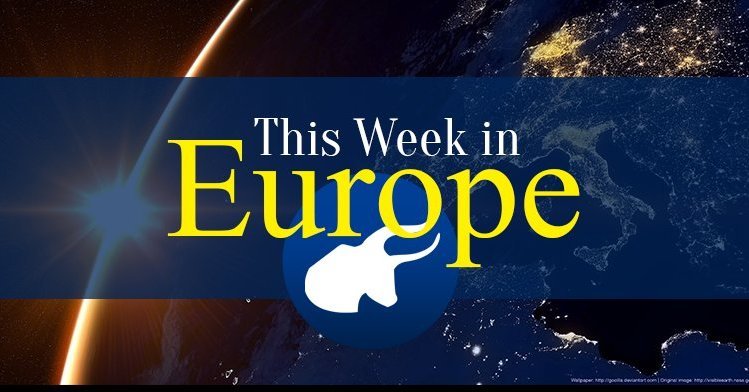Anti-far right march in Austria
Last Saturday, roughly 20,000 people flooded the streets of Vienna to protest against the inclusion of far-right FPO in the coalition led by young Chancellor Sebastian Kurz. The party’s fascist roots and its anti-immigrant policies have been the source of great concern among Austrians.
Romania gets 3rd PM in one year
After winning the elections in December 2016, the Romanian Social-Democratic Party, PSD, has forced its second prime minister to step down after a clash with the party leader, Liviu Dragnea. After losing the support of the party, former PM Mihai Tudose resigned on Monday. Convicted for electoral fraud and suspected of siphoning EU funds, Dragnea cannot occupy the PM seat himself. Therefore, on Tuesday, PSD nominated MEP Viorica Dancila, a close ally of Dragnea, as the new PM. Dancila does not know foreign languages, ranks 700th out of 751 in terms of attendance in the EP and once included Iran and Pakistan as member-states in the EU.
Sweden faces gang violence and Russian election meddling
On Wednesday, Swedish PM Stefan Lofven threatened to deploy the army in order to counter the gang violence that has been occuring throughout the country. Police records show that in 2017, 106 people were murdered in Sweden. At the same time, the Scandinavian country prepares to create a new government agency in order to safeguard its upcoming election from Russian meddling. At a security conference, Lofven indicated that he had information regarding efforts to influence the election, but promised that “only Swedish voters will determine the outcome.”
VAT overhaul & bad loans decrease EU-wide
On Thursday, the European Commission advanced a proposal that would allow member states to decide reduced rates on specific products without needing the unanimous approval of the other members. The same proposal would counter VAT fraud and reduce costs for small and medium enterprises.
In the same day, the Commission published a report which showed that individual or company-owned NPLs (non-performing loans) have reached 4.6%, their lowest level since 2014. However, these loans still represent a total of €950 billion.
Kosovo Serb politician assassinated
On Tuesday, Serbia walked out of EU talks on better relations with Kosovo after an unknown gunman shot and killed Oliver Ivanovic outside his office in Mitrovica, a Serb enclave in Kosovo. The delegation stated that the killing is “an act of terror aimed at destabilising the situation in Kosovo and an attack against all Serbian people.” Ivanovic was a moderate among Kosovo Serb politicians and had played a major role in negotiations with NATO and the EU after the 1998-1999 Kosovo War. Convicted in 2016 of war crimes for his involvement in the killings of ethnic Albanians during the war, Ivanovic saw the ruling overturned and was meant to face a retrial.
EU foreign relations chief Federica Mogherini phoned Serb president Vucic and Kosovo president Hashim Thaci and pledged that the EU’s rule of law mission in Kosovo, Eulex, would “support” the manhunt. Nato, the Organization for Security and Cooperation in Europe (OSCE), and the UN issued similar messages.
U.K. loses EU satellite center
Following the move of the European Medicines Agency and the European Banking Agency, the Commission has decided to relocate the Galileo Satellite Security Monitoring Centre (GSMC) from the small town of Swanwick, in south UK, to Madrid. The decision comes “as a consequence of the UK’s withdrawal from the EU.” The station is part of Europe’s wider global satellite navigation system, Galileo, and supports the main security center in Paris. Not yet operational, the GSMC was supposed to be functional later this year.
Hungary unveils the “Stop Soros” plan
On Wednesday, and three months before a general election, the Hungarian government committed to enacting new laws that would tax and sanction Hungarian NGOs that “assist illegal migration” and receive foreign funding. Part of the “Stop Soros” plan - referring to the Hungarian-born US billionaire and financier - the new laws will require NGOs to provide their data to courts and pay a tax of up to 25% of the funds received from abroad. Moreover, restraining orders will be issued against Hungarians who take part in organising illegal immigration, and will be applicable in any area within 8km of the Schengen border. While critics say that Budapest is going against democracy and rule of law, PM Viktor Orban continues to blame and threaten George Soros.
At the same time, Germany saw a significant decrease in migration in 2017. About 186,644 asylum seekers entered the country last year, compared to 280,000 in 2016 and 890,000 in 2015.
Czech government resigns just weeks into the mandate
On Tuesday, the Czech minority government led by business tycoon Andrej Babiš lost a confidence vote in the chamber of deputies. The vote comes after he was charged with allegedly defrauding EU funds a decade ago. On Wednesday, therefore, only weeks from the general elections of December, the government resigned, with Babiš denying any wrongdoing. A few days later, on Friday, the Czech parliament lifted Babiš’s immunity, opening the way to prosecution, with the former PM asking and voting himself for the motion. However, President Miloš Zeman has promised to appoint Babiš as prime minister again.
Mary Lou McDonald confirmed as the next Sinn Fein leader
A former deputy leader of the Irish left-wing nationalist party is set to lead Sinn Fein after its president of 34 years, Gerry Adams, stepped down in November. McDonald, who was the only candidate nominated for this position, will be also first woman leader in the party’s modern history. Deputy leader elections to fill up her previous position are held on 10th February.
Puigdemont to travel to Denmark from Belgium
Catalonia’s former leader Carles Puigdemont will attend a conference titled “Catalonia and Europe at a crossroads for democracy?” in Copenhagen next week. This will be his first trip abroad since October, when he fled to Belgium. According to the website of the University of Copenhagen, where the conference will be held, Puigdemont will participate in a debate about the secession crisis in the region.



Follow the comments: |
|
